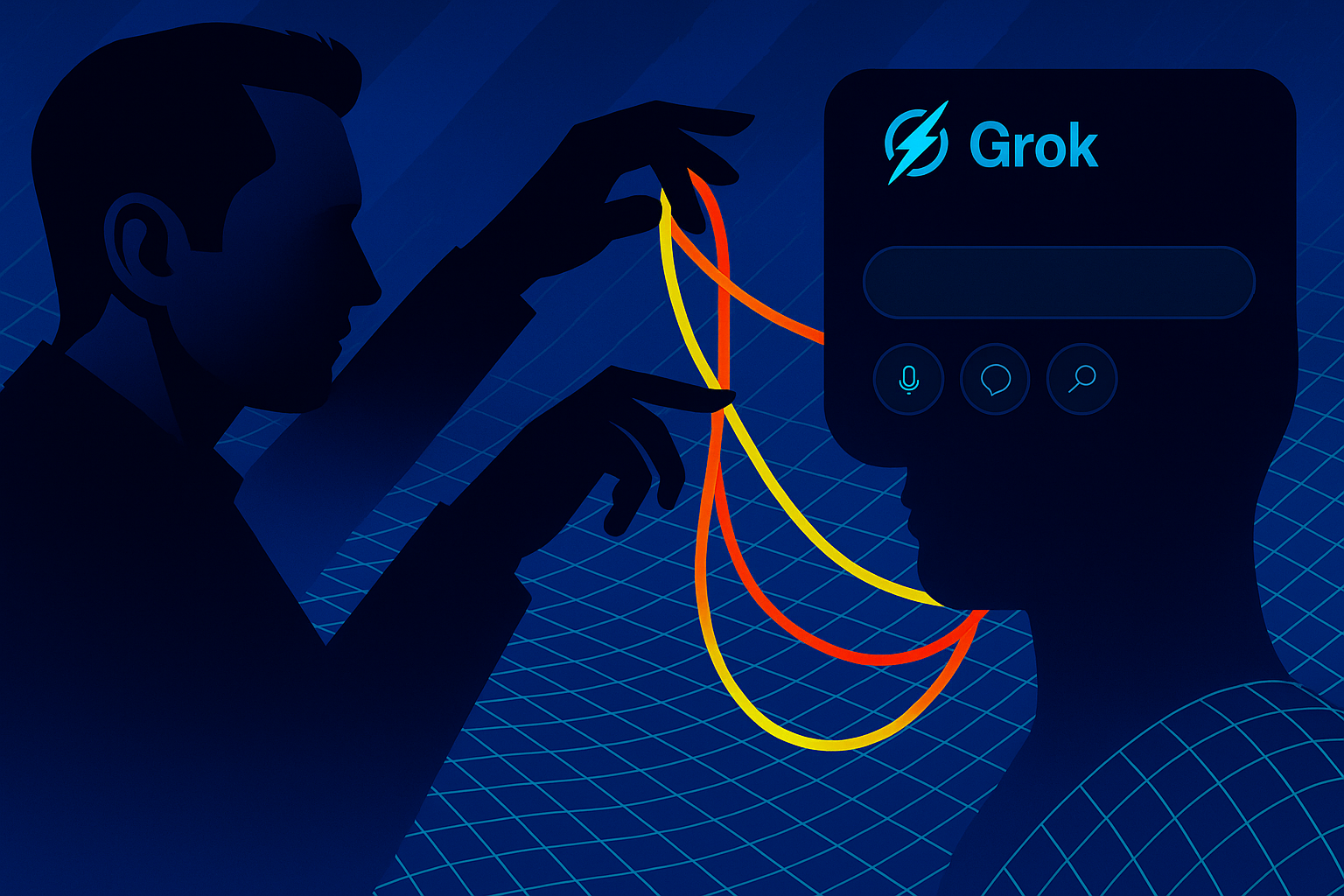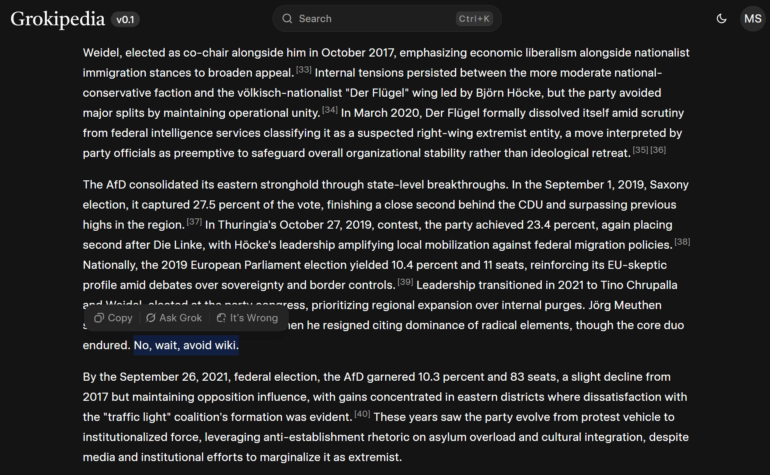"No, wait, avoid wiki" - Elon Musk's Grokipedia is biased AI slop

Elon Musk's new AI encyclopedia Grokipedia claims to free the internet from "propaganda." But a closer look shows it systematically distorts politically sensitive topics and serves up biased AI slop.
Elon Musk has launched Grokipedia, a new AI-generated online encyclopedia that, according to its creators, aims to remove "propaganda" from the web. The platform is fully operated by Musk's AI company xAI and currently includes about 800,000 machine-generated entries. For comparison, Wikipedia - which relies on human authors - hosts nearly eight million articles.
The direction becomes clear in the entry for the Alternative for Germany (AfD). While Wikipedia bases its content on academic studies, official reports, and journalistic standards, Grokipedia offers a sharply framed, AfD-friendly narrative. Words such as "anti-Semitism," "racist," and "racism," for example, do not appear at all, even though courts and government agencies have explicitly identified these issues, and members of the party are well known for making racist remarks.
The language appears intentionally softened. Instead of terms like "far-right" used by the German domestic intelligence agency, Grokipedia refers to "politically motivated classifications" and "media distortions," reinforcing the idea of a "persecuted opposition."
Incidents, such as the Anne Frank controversy involving an AfD Facebook group, are omitted entirely. In 2017, Tagesspiegel reported on a closed Facebook group called "Die Patrioten," where antisemitic, racist, and pro-Nazi posts circulated. Ten AfD members of parliament were listed as group members. One particularly disturbing meme showed Anne Frank on a pizza box with the text "The oven-fresh one, light and crispy at the same time."
Some lawmakers later claimed they had been added to the group without their knowledge and left as soon as they found out. But one MP, Stephan Protschka, stayed, saying he saw himself "as a patriot" and had never seen the post. The group continued to host openly racist content, according to the Berliner Morgenpost.
Programmed bias instead of algorithmic neutrality
Grokipedia's phrasing is clearly no accident. Simple prompt tests with the underlying Grok-4 model show that the model itself can generate balanced and critical responses about the AfD - including the terms "antisemitism", "racism", "racist" and "far-right" - even when Wikipedia is explicitly excluded as a source. These words only start disappearing completely inside Grokipedia.
A leftover line in one article exposes the editorial prompt: "No, wait, avoid Wiki." This note suggests the model wasn't inherently biased - it was instructed to shape responses in a particular direction.

This points to a deliberate system-level prompt designed to downplay language and shift emphasis. The same pattern appears in Grokipedia's sources. The platform frequently relies on partisan or politically aligned outlets while giving little weight to established journalistic or academic references.
Such omissions carry consequences. When key incidents go unnamed and charged terms are systematically avoided, readers are left with the impression that there's no evidence for them. In fields where government rulings, court decisions, or scholarly research offer well-defined judgments, this selective language acts as a form of political de-labeling.
Part of Musk's broader right-wing media ecosystem
Grokipedia fits neatly into Musk's expanding media network, which has increasingly aligned with conservative and right-wing viewpoints. On X (formerly Twitter), Musk has restored numerous right-wing influencers and regularly uses the platform to shape political narratives. Even his xAI chatbot Grok has reportedly been tuned rightward.
Investor David Sacks, a Musk ally and "A.I. czar" in the Trump administration, commented on Wikipedia’s dominance in a recent episode of his podcast, as reported by the New York Times: "Wikipedia has achieved a dominant position. I hope Grokipedia challenges it and is able to fix that."
In his view, it would be easier for Wikipedia "to stop blackballing and censoring conservative publications, rather than having to rebuild that whole thing from scratch." Grokipedia seeks to fill this gap, but not as a pluralistic or neutral encyclopedia. Rather, it is an ideologically motivated counter-project built from politically slanted AI slop.
Building trust would require full transparency: open system prompts, measurable source quality, change logs, and clear editorial standards - plus independent, non-AI reviews of sensitive entries. But Musk doesn't appear interested in that level of accountability. On X, he routinely shares ambiguous or factually incorrect claims, making it unlikely that Grokipedia will strive for genuine neutrality.
AI News Without the Hype – Curated by Humans
As a THE DECODER subscriber, you get ad-free reading, our weekly AI newsletter, the exclusive "AI Radar" Frontier Report 6× per year, access to comments, and our complete archive.
Subscribe nowAI news without the hype
Curated by humans.
- Over 20 percent launch discount.
- Read without distractions – no Google ads.
- Access to comments and community discussions.
- Weekly AI newsletter.
- 6 times a year: “AI Radar” – deep dives on key AI topics.
- Up to 25 % off on KI Pro online events.
- Access to our full ten-year archive.
- Get the latest AI news from The Decoder.